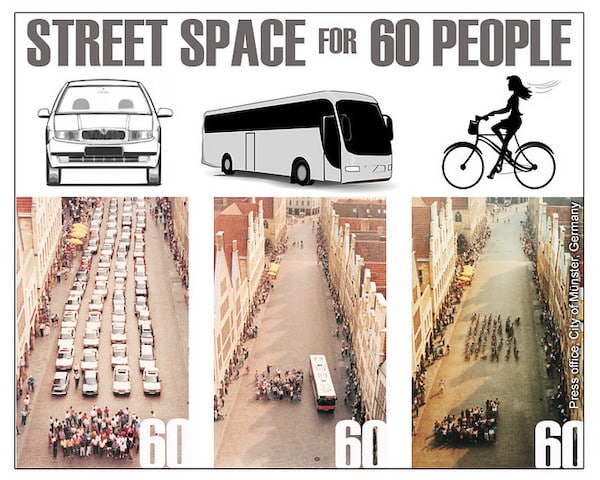Corporate and capitalist forces are driving us toward civilizational collapse but institutional myopia and crass electoralism also play their parts in the unfolding planetary tragedy.
Recently the Montréal fire department objected to a city proposal to remove traffic from the road running through the big park atop the mountain at the centre of the city. The sub headline on the front-page of the Montréal Gazette stated,
Fire department says closing road to all cars, trucks would be unsafe.
Incredible! According to the fire department, reducing the public space devoted to the form of transport that kills more people than any other is not safe. In fact, all evidence suggests the more a city relies on walking, biking, buses and metros the fewer hurt or killed per kilometer of travel (intercity travel by train and plane is also far safer than by private car).
The particulate matter, nitrogen oxide and other pollutants released by private cars are also ‘unsafe’. And the massive recent forests fires–exacerbated by automobile greenhouse gas emissions–are definitely unsafe.
Last week Manitoba NDP leader Wab Kinew announced that he’d ‘axe the tax’–to borrow the slogan of a supposedly polar opposite Conservative politician. Standing in front of a Winnipeg gas station, Kinew said an NDP government would temporarily eliminate the provincial fuel tax if it wins the upcoming election. Currently Manitobans are charged a measly 14 cents per litre in provincial fuel taxes while the OECD average is three times that. Instead of a cut, a mildly climate conscious, social democratic politician would push to increase that tax to European rates of around $.70 per litter.
Kinew’s ecocidal electoral pandering isn’t unique. During the 2015 federal election Green Party leader Elizabeth May added her voice to the main opposition parties telling suburbanites they should expect the federal government to continue aggressively subsidizing the most costly, unhealthy and ecologically destructive form of land transport. She told Le Devoir that her party didn’t necessarily support the Stephen Harper government’s plan to implement a toll when the Champlain Bridge, Canada’s busiest crossing and a key connection between the island of Montreal and the city’s South Shore, was rebuilt for $4 billion.
In office the BC NDP removed tolls on the Vancouver area’s Port Mann and Golden Ears bridges. They’ve also further subsidized BC Ferries despite its automotive bias. In its ecologically upside-down world, a 150-pound person pays $18.50 to go from Vancouver to Victoria while a 4,000-pound vehicle costs $63.85.
As the climate crisis spirals further out-of-control, private car travel is growing. In a province that touts its ecological mindset the number of cars in Québec increased by 2,616,872 between 2011 and 2021. With a population of 8,602,335, there are 6,995,085 cars in Québec. Nearly one automobile per person of driving age.
Vehicles are also getting bigger and heavier as the size of families declines. So are houses, which is made possible by private cars. In fact, the private automobile underpins a land, energy and resource intensive big box retail/suburban economy that is not only spurring the climate crisis but broader ecological collapse.
As discussed in Stop Signs: Cars and Capitalism on the Road to Economic, Social and Ecological Decay the private car is an engine of profit accumulation and conspicuous consumption. Class and corporate forces drove the private car’s rise but institutional myopia and crass electoralism help explain its ongoing dominance.
As we drive ourselves towards a climate apocalypse expect myopic politicians to justify further subsidies for roads on the grounds people have to escape the forest fires.

